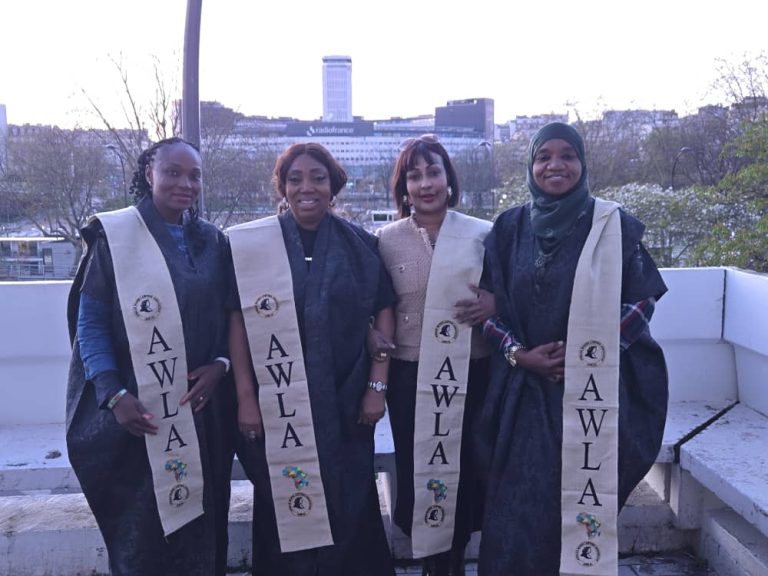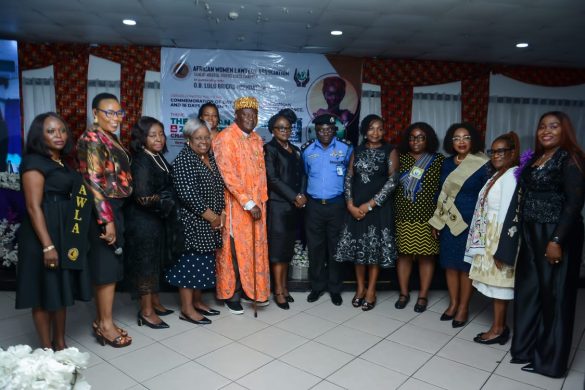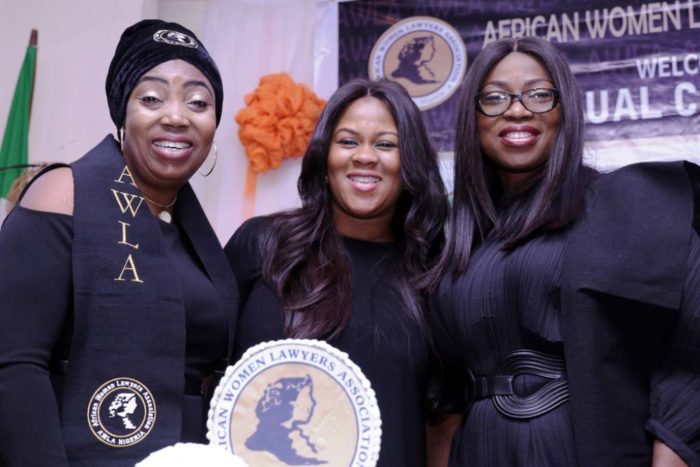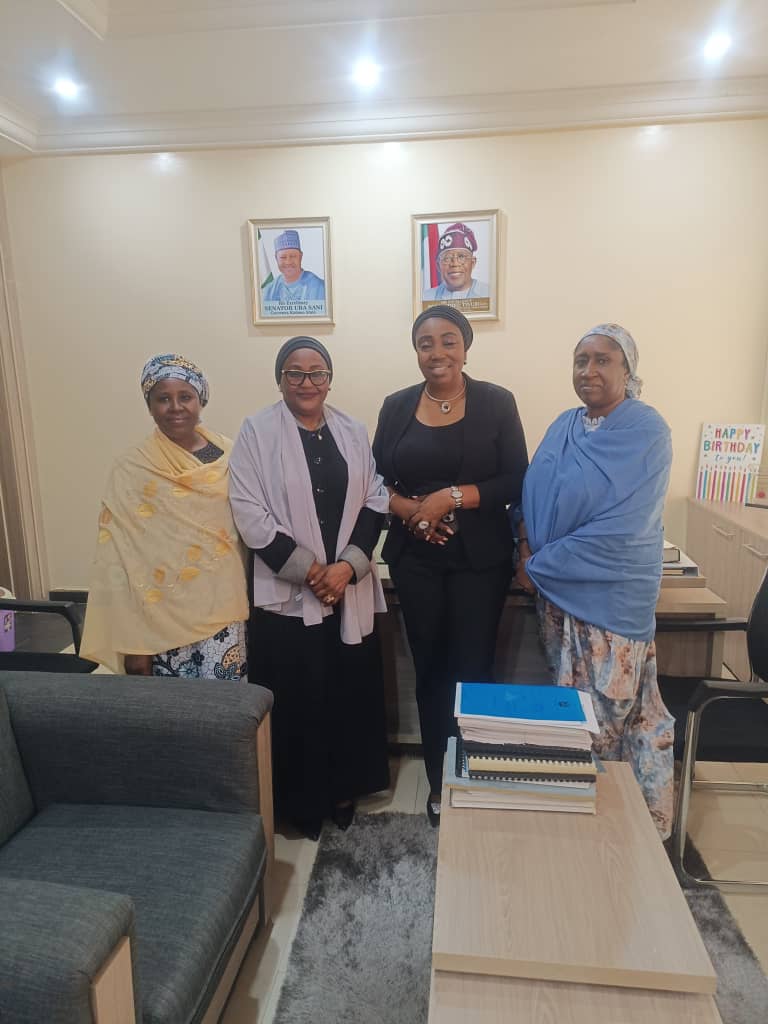Speech on the International Day of the Girl Child by the President of The African Women Lawyers Association (AWLA)
Protocols:
Our Beautiful and Adorable Girls, Gentle Boys, Distinguished Awlans, Fellow Advocates, Gentle Women and Men of the Press, Ladies and Gentlemen
Today, we celebrate the International Day of the Girl Child under the theme: “Girls’ Vision for the Future.
This day is set aside to empower young voices. October 11 marks a pivotal global annual observance celebrating the achievements, and leadership of girls, recognizing the inherent rights and limitless potential of girls worldwide, providing a platform to promote gender equality, amplify girls’ voices and foster inclusive development, leadership and innovation.
Today we at AWLA join the international community in recognizing the transformative power of girls’ empowerment. Together, let’s shape a brighter future for all by recognizing their unstoppable female spirit and synergy, courage, commitment, sacrifice, determination, resilience , compassion, talent, and fortitude.
It is said that girls with dreams become women with vision, purpose and impact. These qualities define girls who dare to dream, and women who shape the future.
Girls’ Vision for the Future: A Roadmap to 2030. This day is a powerful reminder of the potential of every girl across the globe, particularly here in Africa. It calls us to confront the barriers girls face and make bold strides toward a future where they can dream, grow, and thrive, unshackled by discrimination, violence, or inequality.
As we look toward the 2030 Sustainable Development Goals (SDGs), particularly Goal 5—Gender Equality—it is imperative that the voices of girls are at the heart of our global strategy. For African girls, this journey requires us to address deeply rooted societal norms, dismantle obstacles to education and economic empowerment, and eradicate all forms of gender-based violence (GBV). Gender equality is not just a goal; it is the key to unlocking the potential of our continent.
Addressing Gender-Based Violence: A Critical Priority
One of the most pervasive challenges girls face is gender-based violence. This violence, in all its forms—physical, sexual, emotional—constitutes a profound violation of human rights. Over 370 million girls and women globally were subjected to rape or sexual assault as children (UNICEF) October 10, 2024. UNICEF further published its first-ever global estimate on sexual violence against children, revealing that 79 million girls – one in five – in sub-Saharan countries hit by conflicts had experienced sexual assault or rape before turning 18.
The inclusion of non-contact forms of sexual violence, such as online and verbal abuse, reveals a disturbing reality: 650 million girls and women globally
According to the World Health Organization (WHO), one in three women worldwide experiences physical or sexual violence in their lifetime (WHO, 2021). In Nigeria, entrenched patriarchal norms perpetuate violence and inequality. . As highlighted by Mshelia (2021), “Nigeria remains a patriarchal society where men are viewed as dominant and women as subordinate, often resulting in violence when women do not meet culturally imposed expectations.”
Further alarming Statistics
Today, one in five young women aged between 20 and 24 years were married as children.
Nearly one in four partnered/married adolescent girls have experienced sexual or physical abuse.
Globally, 75% of new HIV infections among adolescents occur in girls.
One in three adolescent girls suffer from anaemia, which is a form of malnutrition.
Almost double the number of adolescent girls (one in four) compared to boys are not in any form of education, employment or training.
Globally, 6 per cent of women report that they have been subjected to sexual violence from someone other than their husband or partner.
Over 79 million girls in sub-Saharan Africa raped and bbsexually assaulted: UN
The world has more than 1.1 billion girls
Nankali Maksud, a child violence specialist at UNICEF based in Nairobi, Kenya describes the situation:
“It’s terrifying,” “Itb is generations of trauma.”
Girls who had suffered the trauma of sexual abuse were often unable to learn at school thus the dire need for urgent intervention and treatment to get the survivors back on track.
These discrimination, violent acts are not isolated incidents; they are systemic, perpetuated by cultural definitions of sex roles and expectations of subservience. Many girls and women are economically dependent on men, which exacerbates their vulnerability. A report by Duvvury et al. (2013) reiterates the far-reaching economic and societal costs of GBV, including physical injury, mental health disorders, and significant losses. The UNICEF Executive Director Catherine Russell said
“Sexual violence against children is a stain on our moral conscience,”
“It inflicts deep and lasting trauma, often by someone the child knows and trusts, in places where they should feel safe.”
This alarming statistic necessitates immediate, comprehensive prevention and support strategies to eradicate all forms of violence and abuse and demands urgent and collective action
As lawyers, advocates, and defenders of human rights, we must ensure that girls and women have access to the justice they deserve. We must work to strengthen legal frameworks, such as the Convention on the Elimination of All Forms of Discrimination against Women (CEDAW), while also pressing for greater enforcement of national laws against GBV. Nevertheless, the law alone is not enough; we must change mindsets, ensuring that girls and women know their rights and feel empowered to claim them.
It is pertinent to note however, that while girls and women are disproportionately impacted, boys and men also suffer from sexual violence.
Data reveals:- 240-310 million boys/men (1 in 11) experienced childhood rape/assault, 410-530 million (estimated) when including non-contact forms
Significant data gaps persist: boys’ experiences underreported, non-contact forms of sexual violence understudied. To combat sexual violence against children, increased investment in data collection is crucial.
Education: The Pathway to Equality
Education is a vital tool in this fight. Girls’ vision for the future is incomplete without access to quality education, which is fundamental to breaking the cycle of poverty and discrimination. Yet, many girls in Africa remain out of school due to child marriages, economic hardship, and societal norms that favour boys’ education over girls’. UNICEF (2021) notes that early marriage is a major barrier to girls’ education, especially in rural areas.
We must prioritize universal access to education, providing girls with the tools they need to succeed. This includes not only academic instruction but also digital literacy. In an increasingly digital world, girls must have access to technology and the skills needed to compete in the global economy. By investing in education, we are investing in the future of Africa.
Economic Empowerment: A Game Changer for Girls
Economic empowerment is critical to achieving gender equality. When girls and women are economically independent, they can make decisions about their lives and futures without fear of dependence or coercion. Financial inclusion, equal pay, and job opportunities in male-dominated fields such as science, technology, engineering, and mathematics (STEM) are essential in closing the gender gap.
The African Union’s Agenda 2063 highlights the importance of empowering women economically to drive sustainable development across the continent. Providing access to financial services, entrepreneurial training, and business opportunities, can lift families out of poverty and create a ripple effect that benefits entire communities.
The Roadmap to 2030: A Call to Action
As we approach 2030, the urgency to achieve gender parity grows. The roadmap to attaining this goal requires coordinated action at every level—local, national, and global. Governments, civil society organizations, and international bodies must come together to implement inclusive policies and support grassroots movements that advocate for girls’ rights. Strengthening legal frameworks, providing access to healthcare, and ensuring representation for women in leadership are essential steps in this journey.
In my book, No, Stop! I explore the heart-wrenching stories of defilement and abuse suffered by young girls. These stories are a stark reminder of the work we must do to ensure that no girl ever feels voiceless and that justice is within reach for all victims of violence. Advocacy, education, and legal protection are the pillars of this fight.
Conclusion: A United Vision for Girls’ Future
The International Day of the Girl Child reminds us that the future of our world depends on the success and empowerment of girls. As we look to 2030, let us unite to break the chains of discrimination and violence that hold them back. Let us invest in their education, protect them from harm, and create economic opportunities that allow them to realize their potential.
Unlocking Girls’ Potential: A Brighter Future for All
The facts are clear: investing in girls empowers a better world. With support, resources, and opportunities: 1.1 billion girls can achieve limitless potential.
Girls’ leadership yields immediate and far-reaching impact:
Stronger families
Thriving communities
Economies flourish
Brighter future for generations
Empowering girls transforms lives and shapes a better tomorrow.
SLOGANS:
Investing in girls is the deal!!
When we empower girls, we secure the future of our nations.
Empowering Girls, Empowering Tomorrow
Investing in girls’ futures is investing in our collective prosperity.
Unlocking Girls’ Potential, Unlocking Our Shared Future!
Empower Her, Empower Humanity!
Girls’ the beauty, wealth and conscience of Nations!
Let us act now to protect their dreams and ensure a gender-equal world for all.
Join AWLA, amplify their voices, actions and leadership, invest in the Girl Child today
Mentor, Educate, Inspire, Equip and Impact the Girl Child and make the world a safe haven!!!
Happy International Day of the Girl Child 2024!
Thank you.
Presented by:
Mandy Demechi- Asagba Esq.
On International Day of the Girl Child
11/10/ 2024
mandyasagba@gmail.com
awlainternational@gmail.com
https:/awla.international







